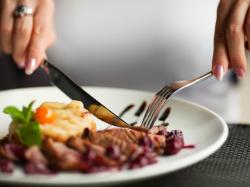Beef Checkoff Helping to Motivate Health Professionals
October 5, 2011 | 3 min to read

The beef checkoff’s nutrition communications program helps motivate health professionals to recommend beef because they recognize that Americans need to eat beef and can eat beef every day to live strong and be strong. The program provides nutrition leaders with the reasons to believe in beef’s contribution to improving health since nearly half of Americans say they are trying to consume more protein, and more than three-quarters of Americans reportedly change the types of food and/or food components to improve the healthfulness of their diet.
That’s why each fall, your beef checkoff attends the American Dietetic Association’s (ADA) annual meeting – the world's largest meeting of food and nutrition experts — where more than 6,000 registered dietitians, nutrition science researchers, policy makers, health-care providers and industry leaders address key issues affecting the health of all Americans. This year’s annual Food & Nutrition Conference & Expo (FNCE) featured more than 100 research and educational presentations, lectures, debates, panel discussions and culinary demonstrations. More than 350 exhibitors, including your beef checkoff, showcased healthy foods and nutrition education materials.
“When I started doing beef promotion in 1994, I gave out beef samples in a grocery store, and consumers refused to take them because their doctors told them they can’t eat red meat. Now, I see the American Heart Association logo or seal on packages of lean beef. That is a huge step in educating nutritionists and dietitians,” says Jeanne Harland, a beef producer from Illinois and vice chairman of the beef checkoff's Joint Nutrition and Health Committee. (Jeanne is pictured here, sharing information at the beef checkoff booth during the ADA conference.) “That mindset is changed by attending shows like ADA and the work that our state and national partners do with influencers," she added. "It’s all about education and showing these nutrition leaders sound checkoff research to base their decisions on. It’s exciting to see actual results.”
This year, the beef checkoff also supported a session titled, “Interpreting Epidemiology: Another New Study… Now What Do I Say?” Sixty-four percent of consumers cite too much conflicting information about which foods are healthy as a roadblock to healthful eating. Registered dietitians need to be able to interpret the most current research for their clients, organizations and the media succinctly and clearly. This session provided concrete examples of how to review epidemiological research and create one or two sentences that puts the research in perspective.
“Most of the questions we received centered around how the lean cuts of beef fit into a weight-loss program,” says Bill Brandenberg, a beef producer from California who met with conference participants at the beef checkoff booth. “As a cattle feeder from the Imperial Valley, it was good for attendees to see a producer face sharing the message about how beef is high in protein, low in fat, and a low-calorie option at mealtime. The younger generation has a lot more concerns about the safety of food and antibiotic use, but they were open-minded and asked great questions.”
In addition, the checkoff’s presence at the trade show included recipe demonstrations and samples, a resource CD, educational materials, “Beef Nutrition IQ and You” challenge and giveaways of the checkoff-funded Healthy Beef Cookbook.
For more information about checkoff-funded activities, visit MyBeefCheckoff.com.
The Beef Checkoff Program was established as part of the 1985 Farm Bill. The checkoff assesses $1 per head on the sale of live domestic and imported cattle, in addition to a comparable assessment on imported beef and beef products. States retain up to 50 cents on the dollar and forward the other 50 cents per head to the Cattlemen's Beef Promotion and Research Board, which administers the national checkoff program, subject to USDA approval.
Source: The Beef Checkof Program
